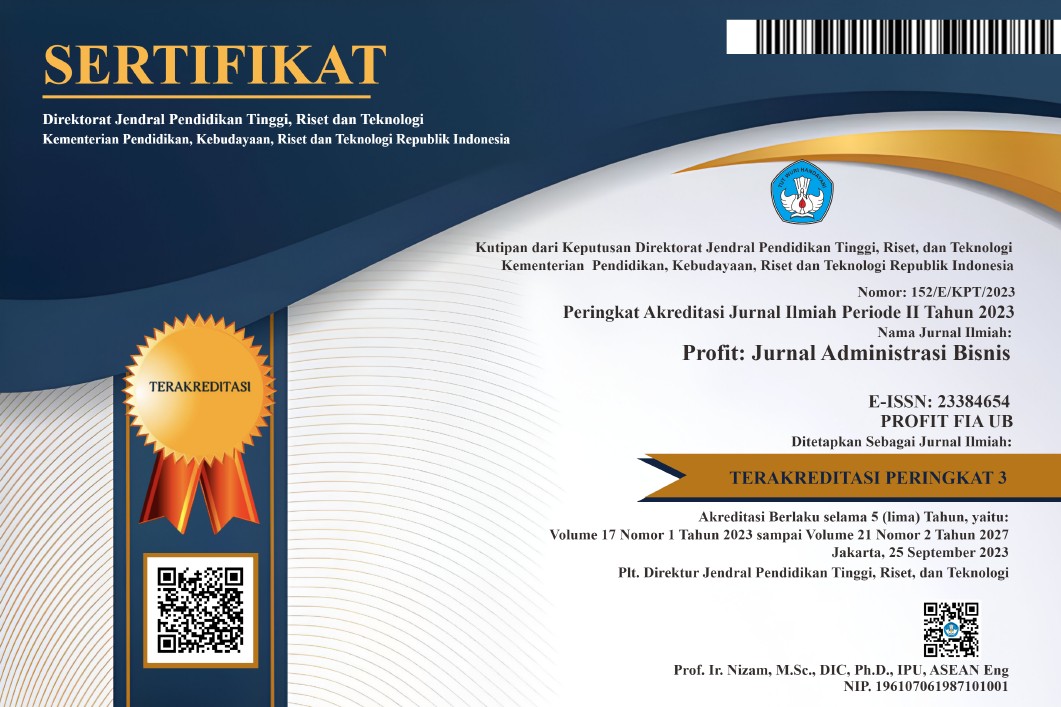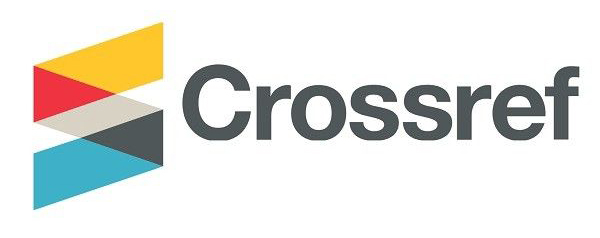CONSUMER WELL-BEING: PERAN BRAND AUTHENTICITY DAN DAMPAKNYA TERHADAP CONSUMER CITIZENSHIP BEHAVIOR
DOI:
https://doi.org/10.21776/ub.profit.2021.015.01.3Keywords:
Consumer Well-Being, Authenticity, Citizenship BehaviorAbstract
This article aims to deepen knowledge about the importance of the concept of consumer well-being  in marketing research, as well as to build propositions related to the potential for consumer well-being and its consequences for marketing outcomes. Through an in-depth study of the existing literature, it can be revealed that CWB is an important construct in marketing research and consumer behavior. CWB measurement can be done by measuring consumer satisfaction which contributes to several positive states of consumers in the form of positive emotions, attachments, relationships, meaning, and achievement (PERMA). In addition, this article succeeded in building a proposition that brand authenticity can have a significant effect on CWB and marketing outcomes in the form of consumer citizenship behavior. The relationship between these variables is based on self-determination theory.
References
Ahuvia, A., Scott, C., & Izberk, E. (2010). Consumer Well-Being. In Wiley International Encyclopedia of Marketing. Jhon Wiley & Sons Ltd.
Bavik, A. (2019). Corporate social responsibility and service-oriented citizenship behavior: A test of dual explanatory paths. International Journal of Hospitality Management, 80(October 2018), 173–182. https://doi.org/10.1016/j.ijhm.2018.11.014
Belk, R. W. (1985). Materialism: Trait Aspects of Living in the Material World. Journal of Consumer Research, 12(3), 265. https://doi.org/10.1086/208515
Beverland, M. B., & Farrelly, F. J. (2010). The Quest for Authenticity in Consumption: Consumers’ Purposive Choice of Authentic Cues to Shape Experienced Outcomes. Journal of Consumer Research, 36(5), 838–856. https://doi.org/10.1086/615047
Bruhn, M., Schoenmüller, V., Schäfer, D., & Heinrich, D. (2012). Brand authenticity: towards a deeper understanding of its conceptualization and measurement. In G.-C. Zeynep, O. Cele, & Z. Rui (Juliet) (Ed.), NA-Advance in Consumer ResearchAdvances of Consumer Research (Vol. 40, hal. 567–576). Duluth, MN: Association for Consumer Research. Diambil dari http://www.acrwebsite.org/volumes/1013106/volumes/v40/NA-40http://www.copyright.com/.
Burroughs, J. E., & Rindfleisch, A. (2002). Materialism and Well-Being: A Conflicting Values Perspective. Journal of Consumer Research, 29(3), 348–370. https://doi.org/10.1086/344429
Busser, J. A., & Shulga, L. V. (2019). Involvement in consumer-generated advertising: Effects of organizational transparency and brand authenticity on loyalty and trust. International Journal of Contemporary Hospitality Management, 31(4), 1763–1784. https://doi.org/10.1108/IJCHM-10-2017-0685
Carter, L. E. P. (2017). A Dynamic and Multi-Dimensional Approach to Consumer Well-Being. UNiversity of Colorado.
Consumer Trends in Health and Wellness. (n.d.). Diambil 6 Desember 2019, dari https://www.forbes.com/sites/thehartmangroup/2015/11/19/consumer-trends-in-health-and-wellness/#663bd494313e
Crabbe, M., Lieberman, G., & Moriarty, S. (2019). Global Consumer Trends 2030. Diambil dari https://www.mintel.com/global-consumer-trends
Davis, B., & Ozanne, J. L. (2018). Measuring the impact of transformative consumer research: The relational engagement approach as a promising avenue. Journal of Business Research, 100(December 2018), 311–318. https://doi.org/10.1016/j.jbusres.2018.12.047
Davis, B., Ozanne, J. L., & Hill, R. P. (2016). The Transformative Consumer Research Movement. Journal of Public Policy and Marketing, 1–27.
Davis, B., & Pechmann, C. (2013). Introduction to the Special Issue on transformative consumer research: Developing theory to mobilize efforts that improve consumer and societal well-being. Journal of Business Research, 66(8), 1168–1170. https://doi.org/10.1016/j.jbusres.2012.08.008
Deci, E. L., & Ryan, R. M. (2017). Self-Determination Theory: Basic Psychological Needs in Motivation Development and Wellness. New York: Guilford Publishing. New York: The Guilford Press. https://doi.org/10.1097/TA.0b013e31827e1534
Diener, E., Ng, W., Harter, J., & Arora, R. (2010). Wealth and Happiness Across the World: Material Prosperity Predicts Life Evaluation, Whereas Psychosocial Prosperity Predicts Positive Feeling. Journal of Personality and Social Psychology, 99(1), 52–61. https://doi.org/10.1037/a0018066
Diener, E., & Seligman, M. E. P. (2002). Very happy people. Psychological Science, 13(1), 81–84. https://doi.org/10.1111/1467-9280.00415
Diener, E., & Seligman, M. E. P. (2004). Beyond Money: Progress on an Economy of Well-Being. Psychological Science in the Public Interest, 5(1), 1–31. https://doi.org/10.1177/1745691616689467
Edelman. (2015). New Edelman Study Reveals Americans Face a Dilemma in Their Pursuit of Well-Being. Diambil 8 Februari 2020, dari https://www.edelman.com/news-awards/new-edelman-study-reveals-americans-face-dilemma-their-pursuit-well-being
Eggers, F., O’Dwyer, M., Kraus, S., Vallaster, C., & Güldenberg, S. (2013). The impact of brand authenticity on brand trust and SME growth: A CEO perspective. Journal of World Business, 48(3), 340–348. https://doi.org/10.1016/j.jwb.2012.07.018
Falter, M., & Hadwich, K. (2019). Customer service well-being: scale development and validation. Service Industries Journal, 40(1–2), 181–202. https://doi.org/10.1080/02642069.2019.1652599
Fritz, K., Schoenmueller, V., & Bruhn, M. (2017). Authenticity in branding – exploring antecedents and consequences of brand authenticity. European Journal of MarketingEuropean Journal of Marketing, 51(2), 324–348. https://doi.org/10.1108/EJM-10-2014-0633
Gilmore, J. H., & Pine II, B. J. (2007). Authenticity: What Consumer Really Want (1 ed.). Boston, Massachusetts: Harvard Business School Press.
Grayson, K., & Martinec, R. (2004). Consumer Perceptions of Iconicity and Indexicality and Their Influence on Assessments of Authentic Market Offerings. Journal of Consumer Research, 31(2), 296–312. https://doi.org/10.1086/422109
Groth, M. (2005). Customers as good soldiers: Examining citizenship behaviors in internet service deliveries. Journal of Management, 31(1), 7–27. https://doi.org/10.1177/0149206304271375
Groth, M., Mertens, D. P., & Murphy, R. O. (2014). Customers as good soldiers: Extending organizational citizenship behavior research to the customer domain. In D. L. Turnipseed (Ed.), Handbook of Organizational Citizenship Behavior (hal. 415–433). Nova Science Publishers, Inc.
Grzeskowiak, S., & Sirgy, M. J. (2007). Consumer Well-Being (CWB): The Effects of Self-Image Congruence, Brand-Community Belongingness, Brand Loyalty, and Consumption Recency. Applied Research in Quality of Life, 2(4), 289–304. https://doi.org/10.1007/s11482-008-9043-9
Gundlach, G. T., & Wilkie, W. L. (2009). The American marketing association’s new definition of marketing: Perspective and commentary on the 2007 revision. Journal of Public Policy and Marketing, 28(2), 259–264. https://doi.org/10.1509/jppm.28.2.259
Hair, J. F., Hult, G. T. M., Ringle, C. M., & Sarstedt, M. (2017). A Primer on Partial Least Squares Structural Equation Modeling ( PLS-SEM ) (2 ed.). USA: SAGE Publications, Inc.
Hwang, K., & Lee, B. (2019). Pride, mindfulness, public self-awareness, affective satisfaction, and customer citizenship behaviour among green restaurant customers. International Journal of Hospitality Management, 83(December 2018), 169–179. https://doi.org/10.1016/j.ijhm.2019.05.009
Jian, Y., Zhou, Z., & Zhou, N. (2019). Brand cultural symbolism, brand authenticity, and consumer well-being: the moderating role of cultural involvement. Journal of Product and Brand Management, 28(4), 529–539. https://doi.org/10.1108/JPBM-08-2018-1981
Jones, D. G. B., & Monieson, D. D. (1990). Early Development of Philosophy of Marketing Thought. Journal of Marketing, 54(1), 102–113.
Kasser, T., & Ahuvia, A. (2002). Materialistic values and well-being in business students. European Journal of Social Psychology, 32(1), 137–146. https://doi.org/10.1002/ejsp.85
Kernis, M. H., & Goldman, B. M. (2006). A Multicomponent Conceptualization of Authenticity: Theory and Research. Advances in Experimental Social Psychology, 38(06), 283–357. https://doi.org/10.1016/S0065-2601(06)38006-9
Kim, I., Jeon, S. M., & Hyun, S. S. (2012). Chain restaurant patrons’ well-being perception and dining intentions: The moderating role of involvement. International Journal of Contemporary Hospitality Management, 24(3), 402–429. https://doi.org/10.1108/09596111211217888
Kotler, P., & Armstrong, G. (2017). Principles of Marketing (17th ed.). United Kingdom: Pearson Education Limited.
Kuppelwieser, V. G., & Finsterwalder, J. (2016). Transformative service research and service dominant logic: Quo Vaditis? Journal of Retailing and Consumer Services, 28(October 2017), 91–98. https://doi.org/10.1016/j.jretconser.2015.08.011
Layton, R. A. (2019). Marketing Systems – Looking Backward , Sizing up and Thinking Ahead. Journal of Macromarketing, XX(X), 1–17. https://doi.org/10.1177/0276146718823897
Le, T. H., Arcodia, C., Novais, M. A., & Kralj, A. (2019). What we know and do not know about authenticity in dining experiences: A systematic literature review. Tourism Management, 74(February), 258–275. https://doi.org/10.1016/j.tourman.2019.02.012
Levitt, T. (1960). Marketing Myopia. Harvard Business Review, Vol.38, 45–56.
Malhotra, N. K. (2006). Consumer well-being and quality of life: An assessment and directions for future research. Journal of Macromarketing, 26(1), 77–80. https://doi.org/10.1177/0276146705285970
Mick, D. G., Pettigrew, S., Pechmann, C., & Ozanne, J. L. (2012). Transformative Consumer Research for Personal and Collective Well-Being. New York, London: Routledge.
Mogilner, C., Aaker, J., & Kamvar, S. D. (2012). How Happiness Affects Choice. Journal of Consumer Research, 39(2), 429–443. https://doi.org/10.1086/663774
Morhart, F., Malär, L., Guèvremont, A., Girardin, F., & Grohmann, B. (2014). Brand authenticity: An integrative framework and measurement scale. Journal of Consumer Psychology, 25(2), 200–218. https://doi.org/10.1016/j.jcps.2014.11.006
Moulard, J. G., Raggio, R. D., & Folse, J. A. G. (2016). Brand Authenticity: Testing the Antecedents and Outcome of Brand Management’s Passion for its Products. Psychology & Marketing, 33(6), 421–436. https://doi.org/DOI: 10.1002/mar.20888
Nason, R. W. (2011). Institutionalization of Macromarketing. Journal of Historical Research in Marketing, 3(2), 261–268.
Organ, D. W., Podsakoff, P. M., & MacKenzie, S. B. (1983). Organizational citizenship behavior: Its nature and antecedents. Journal of Applied Psychology, 68(4), 653–663.
Pancer, E., & Handelman, J. (2012). The evolution of consumer well-being. Journal of Historical Research in Marketing, 4(1), 177–189. https://doi.org/10.1108/17557501211195118
Revilla-Camacho, M. Ã., Vega-Vázquez, M., & CossÃo-Silva, F. J. (2015). Customer participation and citizenship behavior effects on turnover intention. Journal of Business Research, 68(7), 1607–1611. https://doi.org/10.1016/j.jbusres.2015.02.004
Ryan, R. M., & Deci, E. L. (2001). On Happiness and Human Potentials : A Review of Research on Hedonic and Eudaimonic Well-Being. Annual review Psycology, 52(1), 41–66.
Ryff, C. D. (1989). Happiness Is Everything , or Is It ? Explorations on the Meaning of Psychological Well-Being. Journal of pesonality and social psychology, 57(6), 1069–1081.
Ryff, C. D., & Keyes, C. L. M. (1995). The Structure of Psychological Well-Being Revisited. Journal of pesonality and social psychology, 69(4), 719–727.
Ryff, C. D., Magee, W. J., Kling, K. C., & Wing, E. H. (1999). Forging Macro-Micro Linkages in the Study of Psychological Well-Being. In C. D. Ryff & V. W. Marshall (Ed.), The Self and Society in Aging Processes (hal. 247–278). New York: Springer Publishing Company.
Sarstedt, M., Hair, J. F., Cheah, J. H., Becker, J. M., & Ringle, C. M. (2019). How to specify, estimate, and validate higher-order constructs in PLS-SEM. Australasian Marketing Journal, 27(3), 197–211. https://doi.org/10.1016/j.ausmj.2019.05.003
Sawyer, M. (2019). Organic Beauty and Wellbeing Market 2019.
Schnebelen, S., & Bruhn, M. (2018). An appraisal framework of the determinants and consequences of brand happiness. Psychology and Marketing, 35(2), 101–119. https://doi.org/10.1002/mar.21073
Seligman, M. E. P. (2012). Flourish: A Visionary New Understanding of Happiness and Well-Being (2 ed.). North Sydney: Random House Australia Pty Ltd.
Shaw, E. H., & Jones, D. G. B. (2005). A history of schools of marketing thought. Marketing Theory, 5(3), 239–281. https://doi.org/10.1177/1470593105054898
Sheth, J. N., & Sisodia, R. (2005). Does marketing need reform? In marketing renaissance: Opportunities and imperatives for improving marketing thought, practice, and infrastructure. Journal of Marketing, 69(4), 10–12.
Shultz, C. J., & Shapiro, S. J. (2014). Constructive Engagement, Macromarketing, and Humanistic Marketing. In R. J. Varey & M. Pirson (Ed.), Humanism in Business Series: Humanistic Marketing (hal. 176–191). New York: Palgrave Macmillan Ltd.
Sirgy, M. J., & Lee, D. (2008). Well-being Marketing : An Ethical Business Philosophy for Consumer Goods Firms. Journal of Business Ethics, 77(4), 377–403. https://doi.org/10.1007/sl0551-007-9363-y
Sirgy, M. J., Lee, D., & Rahtz, D. (2007). Research on Consumer Well-Being ( CWB ): Overview of the Field and Introduction to the Special Issue. Journal of Macromarketing, 27(4), 341–349. https://doi.org/10.1177/0276146707307212
Smith, N. C., Drumwright, M. E., & Gentile, M. C. (2010). Insead Marketing Myopia (1). Journal of Public Policy & Marketing, 29(Spring), 4–11. Diambil dari www.insead.edu
Troebs, C. C., Wagner, T., & Heidemann, F. (2018). Transformative retail services: Elevating loyalty through customer well-being. Journal of Retailing and Consumer Services, 45(September), 198–206. https://doi.org/10.1016/j.jretconser.2018.09.009
Tung, V. W. S., Chen, P. J., & Schuckert, M. (2017). Managing customer citizenship behaviour: The moderating roles of employee responsiveness and organizational reassurance. Tourism Management, 59, 23–35. https://doi.org/10.1016/j.tourman.2016.07.010
Varey, R. J., & Pirson, M. A. (2014). Humanism in Business Series: Humanistic Marketing. London: Palgrave Macmillan Ltd.
Vargo, S. L., & Lusch, R. F. (2008). Service-dominant logic: Continuing the evolution. Journal of the Academy of Marketing Science, 36(1), 1–10. https://doi.org/10.1007/s11747-007-0069-6
Venhoeven, L. A., Bolderdijk, J. W., & Steg, L. (2013). Explaining the paradox: How pro-environmental behaviour can both thwart and foster well-being. Sustainability (Switzerland), 5(4), 1372–1386. https://doi.org/10.3390/su5041372
Waterman, A. S. (1993). Two Conceptions of Happiness : Contrasts of Personal Expressiveness ( Eudaimonia ) and Hedonic Enjoyment. Journal of pesonality and social psychology, 64(4), 678–691.
Wilkie, W. L., & Moore, E. S. (1999). Marketing’s Contributions to Society. Journal of Marketing, 63, 198–218.
Wilkie, W. L., & Moore, E. S. (2003). Scholarly Research in Marketing : Exploring the “ 4 Eras †of Thought Development, 22(2), 116–146.
Wilkie, W. L., & Moore, E. S. (2006). Macromarketing as a Pillar of Marketing Thought. Journal of Macromarketing, 26(2), 224–232. https://doi.org/10.1177/0276146706291067
Wilkie, W. L., & Moore, E. S. (2007). What does the definition of marketing tell us about ourselves? Journal of Public Policy and Marketing, 26(2), 269–276. https://doi.org/10.1509/jppm.26.2.269
Wilkie, W. L., & Moore, E. S. (2012). Expanding our understanding of marketing in society. Journal of the Academy of Marketing Science, 40(1), 53–73. https://doi.org/10.1007/s11747-011-0277-y
Wooliscroft, A. G., & Wooliscroft, B. (2017). Well-Being and Everyday Ethical Consumption. Journal of Happiness Studies. https://doi.org/10.1007/s10902-017-9944-0
Wooliscroft, B. (2014). Rehumanizing Marketing (and Consumer Behaviour). In R. J. Varey & M. Pirson (Ed.), Humanism in Business Series: Humanistic Marketing (hal. 53–58). New York: Palgrave Macmillan Ltd. https://doi.org/10.1057/9781137353290
Yi, Y., & Gong, T. (2008). The effects of customer justice perception and affect on customer citizenship behavior and customer dysfunctional behavior. Industrial Marketing Management, 37(7), 767–783. https://doi.org/10.1016/j.indmarman.2008.01.005
Yi, Y., & Gong, T. (2009). An integrated model of customer social exchange relationship: The moderating role of customer experience. Service Industries Journal, 29(11), 1513–1528. https://doi.org/10.1080/02642060902793474
Yi, Y., & Gong, T. (2013). Customer value co-creation behavior: Scale development and validation. Journal of Business Research, 66(9), 1279–1284. https://doi.org/10.1016/j.jbusres.2012.02.026
Yi, Y., Gong, T., & Lee, H. (2013). The Impact of Other Customers on Customer Citizenship Behavior. Psychology and Marketing, 30(4), 341–356. https://doi.org/10.1002/mar
Yi, Y., Nataraajan, R., & Gong, T. (2011). Customer participation and citizenship behavioral influences on employee performance, satisfaction, commitment, and turnover intention. Journal of Business Research, 64(1), 87–95. https://doi.org/10.1016/j.jbusres.2009.12.007
Zhao, C., & Wei, H. (2019). The Highest Hierarchy of Consumption: A Literature Review of Consumer Well-Being. Open Journal of Social Sciences, 07(04), 135–149. https://doi.org/10.4236/jss.2019.74012
Downloads
Published
Issue
Section
License
The copyright of the received article shall be assigned to the journal as the publisher of the journal. The intended copyright includes the right to publish the article in various forms (including reprints). The journal maintains the publishing rights to the published articles.

This work is licensed under a
Creative Commons Attribution-NonCommercial 4.0 International License

















